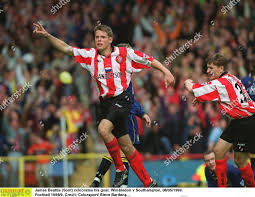The Legacy of James Beattie in English Football

Introduction
James Beattie, the former English football striker, is known for his impactful career in the Premier League and his contributions to the international game. With a height of 1.85 m and a robust playing style, Beattie was an exciting player to watch. His experience in top-tier football not only makes him a revered figure in the sport but also serves as inspiration for many aspiring young players. Understanding Beattie’s journey is essential for comprehending the evolution of English football in the late 1990s and 2000s.
Career Highlights
James Beattie began his professional career at Southampton, where he made a significant mark with impressive goal-scoring abilities. After his debut in 1998, he quickly became the club’s top scorer, cementing his status as a vital asset. In the 2002-03 season, he was pivotal in helping Southampton reach the FA Cup final. His success at Southampton earned him a move to Everton in 2005, where he continued to showcase his talent, playing alongside some of the league’s elite.
Beattie also had stints at several other clubs, including Sheffield United and Stoke City, where his experience and leadership proved invaluable. Beyond club football, Beattie represented England on the international stage, earning 10 caps between 2002 and 2004. His international career, while short-lived, highlighted his capabilities on a greater scale and made him part of a competitive England setup during a transitional period for the national team.
Recent Developments
Following his retirement from professional playing, Beattie transitioned into coaching and football management, where he continues to influence the sport. Recently, he has been involved in youth development programs aimed at nurturing the next generation of talent. Beattie’s dedication to coaching further solidifies his commitment to football and highlights the importance of passing on knowledge and experience to upcoming athletes.
Conclusion
The legacy of James Beattie is not solely defined by his goals on the pitch but also by his ongoing contributions to football through coaching and mentoring. As the sport continues to change, the importance of former players like Beattie in shaping young talents cannot be underestimated. His impact on English football can be felt both in his remarkable career and in his efforts to foster the next wave of players. Looking forward, Beattie’s work in youth coaching may very well lead to a new generation of players who look to emulate his success.









